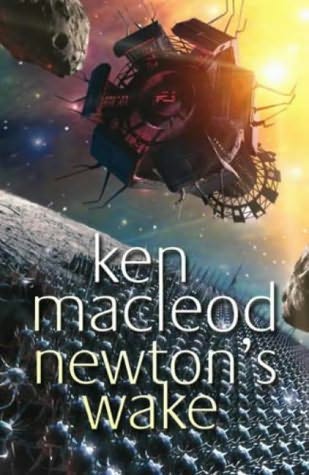
Newton's Wake
Ken MacLeod
369 pages
published in 2004
After the disappointment of MacLeod's last trilogy, it's good to see him back in form again with Newton's Wake. It helps that this is a standalone novel, rather than the first novel of a new series and as such is somewhat less ambitious than his Engines of Light series.
The backstory to Newton's Wake is rather similar to that of Charlie Stross's Singularity Sky in that Humanity went through the Singularity, which MacLeod calls the "Hard Rapture" ("The singularity is the Rapture for Nerds"). In this Rapture uploaded intelligences and Airtificial Intelligences quickly became superhuman, then gods before disappearing up their own backside, leaving behind various incomprehensible artifacts, including a FTL drive and a warren of wormhole tunnels, called the Skein. Various cultures have taken these technologies and colonised other systems: there's America Offline, the Japanese descended Knights of Enlightenment and Democractic Korea, all major powers. There's also the Carlyles, minor Glaswegian thugs before the Rapture, turned plunderers on an interstellar scale after.
Lucinda Carlyle is a junior member of the clan, leading a combat archeaology mission to a newly discovered planet in the Skein. It turns out this planet, Eurydice, is already inhabited by humans,who though they had travelled there with a sublight ship and lived tens of thouisands of years later then they actually did... Though these people were cut off from the rest of humanity, Lucinda knows whot hey are, the people who fled the Solar System rather then fight the war machines that were still ravaging Earth in the aftermath of the Singularity. For the Carlyles, who had to endure untold horrors during this time, this makes them not their most favourite of people. Before they can do anything about it though, the other important factions turn up and the discovery of Eurydice leads to a crisis point...
What I liked about Newton's Wake is the inventiveness of MacLeod, which is coupled to a very Scottish sort of realism. Though it has some outlandish ideas, it never feels as detached from reality as the more classic, American, space operas did. Newton's Wake is firmly grounded in the here and now and its this foundation that gives the more fantastic developments in the story, the more incredible ideas in its background their reality. I missed this in his previous trilogy, especially in Engine City, which at times seemed more like a parody of his usual writing.
So yeah, if you sort of lost interest in MacLeod after the Engines of Light series, give Newton's Wake a go; you will be pleasantly surprised. MacLeod has recovered his old form.
